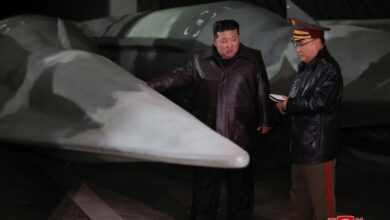A new giant is emerging in Africa as the government of Ethiopia’s new prime minister, Abiy Ahmed, is attempting to change the country’s grand strategic posture. Following the announcement of historic reforms, Ahmed and Eritrean President Isaias Afwerki signed a ‘Joint Declaration of Peace and Friendship’ in a historic meeting on Monday, July 9 after years of icy relations.
Ethiopia has made important peace initiatives in recent months which appear designed to give the country a more global outlook and undermine groups within the government opposed to Ahmed’s reforms.
Last month Ethiopia agreed to abide by the 2000 Algiers Agreement designed to end the Eritrean–Ethiopian War (1998-2000) which likely killed over 250,000 people. Prior to that announcement the Eritrean government had long maintained Ethiopia’s rejection of that agreement was a obstacle to peace.
Eritrea and Ethiopia have signed a Joint Declaration of Peace and Friendship today. The Agreement, which specifies five pillars, was signed this morning at State House by President Isaias Afwerki and Prime Minister Abiy Ahmed pic.twitter.com/ACSticSWpm
— Yemane G. Meskel
(@hawelti) July 9, 2018
“Eritrea was consistently saying they would only talk when Ethiopia has complied with the Algiers ruling,” said Habte Hagos of the advocacy group Eritrea Focus.
“The Ethiopian Prime Minister in his recent visit to Saudi Arabia and through the Crown Prince of Saudi Arabia (who is said to be a good friend of the Eritrean dictator), tried to speak with President Isaias of Eritrea by telephone. But Isaias refused to speak with [Abiy],” Hagos told The Defense Post.
From 1961 until 1991 Eritrean rebels waged a guerrilla campaign to re-establish Eritrea as an independent entity following its incorporation into Ethiopia at the end of World War II.
The two leaders held a historic meeting in Eritrea on Monday, July 9, where they signed a five-point plan for normalizing relations going forward.
“The “state of war that existed between the two countries has come to an end,” Eritrea’s Minister of Information Yemane G. Meskel said, quoting from the joint statement.
“Aspiring to normalize relations with Eritrea of relations with Eritrea is part of the the government’s push to increase regional integration in transport infrastructure,” said Jordan Anderson, an Analyst at IHS.
“The aim is to reduce Ethiopia’s dependence on Djibouti’s port and gain better access to ports in Sudan, Somalia (in particular the Somaliland region), and Kenya – as well as eventually through Eritrean ports at Assab and Massawa.”
The new government is also seeking to defuse the armed movements within the country. Ethiopia’s cabinet passed a resolution last week seeking to delist the Ogaden National Liberation Front, the Oromo Liberation Front and Ginbot 7 as terrorist groups.
“The time we fought for and the time many Ethiopians died for has come,” Ephrem Madebo, a spokesperson for the group, told The Defense Post. “We strongly believe that we Ethiopians can now discuss about the future of our nation. So why fight or carry guns?”
Ginbot 7, which has strong ties to the Ethiopian diaspora in North America, was formed as a protest movement following Ethiopia’s disputed 2005 elections. The Ethiopian government first listed it as a terrorist organization in 2011.
“Justice, liberty, democracy and equality are the normal way of life in Ethiopia. Almost all of our members started the struggle to do this in Ethiopia,” Madebo said.
Madebo stated that even during periods of armed struggle the group never abandoned non-violent initiatives and that, from their perspective, the group was forced to take up arms by “the regime in Ethiopia.”
Here again normal relations with Eritrea can help ease Ethiopia’s security burden. Following the end of the Eritrean-Ethiopian War in 2000, the Eritrean government continued the confrontation through support to opposition groups in Ethiopia. It also provided weapons to Somalia’s Islamic Courts Union when Ethiopia invaded that country in 2006.
It remains unclear what ties the Eritrean government has to Ethiopian opposition groups at present.
Peace dividend
The peace agreements with Eritrea and Ethiopian rebel groups should allow the country of 90 million to earn a sizable peace dividend. The government has announced plans to privatize Ethio Telecom, Ethiopian Airlines, Ethiopian Power, and the Maritime Transport and Logistics Corporation to local and foreign investors.
“The Ethiopian Government has recently declared its intentions to partially or fully privatize state monopolies,” said Sara Demsis, a Research Analyst with Asoko Insight based in Addis Ababa. “In order to ease foreign currency shortages, strength market connectivity and to bring solution to the widespread unemployment the country currently faces.”
The joint declaration signed on Monday provides for close cooperation in the political, economic, social, cultural and security areas, Meskel said. Transport, trade and telecommunication ties are to be re-established.
Abiy’s government announced in May plans to investment in the development of Port Sudan on the Red Sea. Such a move could open up opportunities for an economic “Horn of Africa Union,” an idea that has been proposed by everyone from Sudanese President Omar Al Bashir to the government of Djibouti in recent years.
With the possible exception of Eastern Europe, the Horn of Africa has seen more conventional warfare than any other region of the world since 1991. This is largely due to Eritrea which fought wars with Djibouti, Ethiopia and Yemen since independence in 1993.
Ethiopia’s economic clout could be pulling the region’s economies closer together.
One signpost to watch in this regard is the development of the Grand Ethiopian Renaissance Dam whose reservoir will soon begin filling. Egypt in the past has threatened military action against the dam. Since the 19th Century, when Egypt’s Khedive established military outposts in what is today Somalia and Uganda, Cairo has seen control of the Nile’s waters as part of its national security.
Sabre-rattling aside, Egyptian President Abdel Fattal al-Sisi can do little but watch as Egypt becomes increasingly dependent on the goodwill of Ethiopia in providing Egypt with the Nile water it desperately needs. There is also potential that the dam could further integrate the Sudanese and Ethiopian economies as Sudan plans to purchase electricity generated by the project.
The new Navy
Ethiopia – the world’s most populous landlocked country – has signaled that it will create a navy but, in truth its naval aspirations never fully disappeared. Ethiopia created its first navy in 1958 in what is today Eritrea. Even after Eritrean independence in 1991, the Ethiopian fleet survived by sailing across the Red Sea to friendly ports in Yemen. From there the vessels were moved to Djibouti in 1996.
Each move resulted in leaving behind vessels deemed not seaworthy. Today, Djibouti is home to military installations but, in 1996, Djibouti demanded the ships leave as Ethiopia had failed to pay port duties. Most of the vessels were scrapped, though some were sold to Eritrea. One vessel, GB-21, was trucked to Lake Tana where it remains stationed today.
The lake is also home to the Ethiopian Maritime Training Institute which trains 500 marine engineers and electro-technical officers annual and hopes to double to that number as it reorientates.
The question is now where it will base. Kenya, Sudan, Djibouti, and even Eritrea are all possibilities. There is some international precedent for such a policy. For example, Bolivia currently maintains a naval vessel germanely stationed in Argentina as part of its aspiration to regain access to the sea – an event marked each March 23 in “Day of the Sea” festivities.
The plan to build a navy might be part of Abiy’s effort to build new government institutions whose loyalties lie with him rather than the old guard. Since his statement on June 5, nothing has been announced further regarding Ethiopia’s naval aspirations.
Abiy’s government has already replaced some senior members of Ethiopia’s defense establishment. General Samora Yunis, who served as Ethiopia’s Chief of Staff for 17 years, was replaced by General Seare Mekonen, another senior military officer and fellow member of the Tigreyan ethnic group.
Furthermore, Abiy has named Ethiopian Air Force General Adem Mohammed as the new director of the National Intelligence and Security Services. Mohammed succeeds Getachew Assefa, who was a member of Ethiopia’s second largest ethnic group, the Amhara.
Mohammed, like Abiy, is a member of the Oromo ethnic group – the largest in the country.
How political dynamics will play in the development of the navy remain unclear.
“We should watch and see how quickly a navy is actually created and staffed, as that will indicate whether it’s a priority for Prime Minister Ahmed, thereby showing us if it is part of a power-play,” Anderson said.












